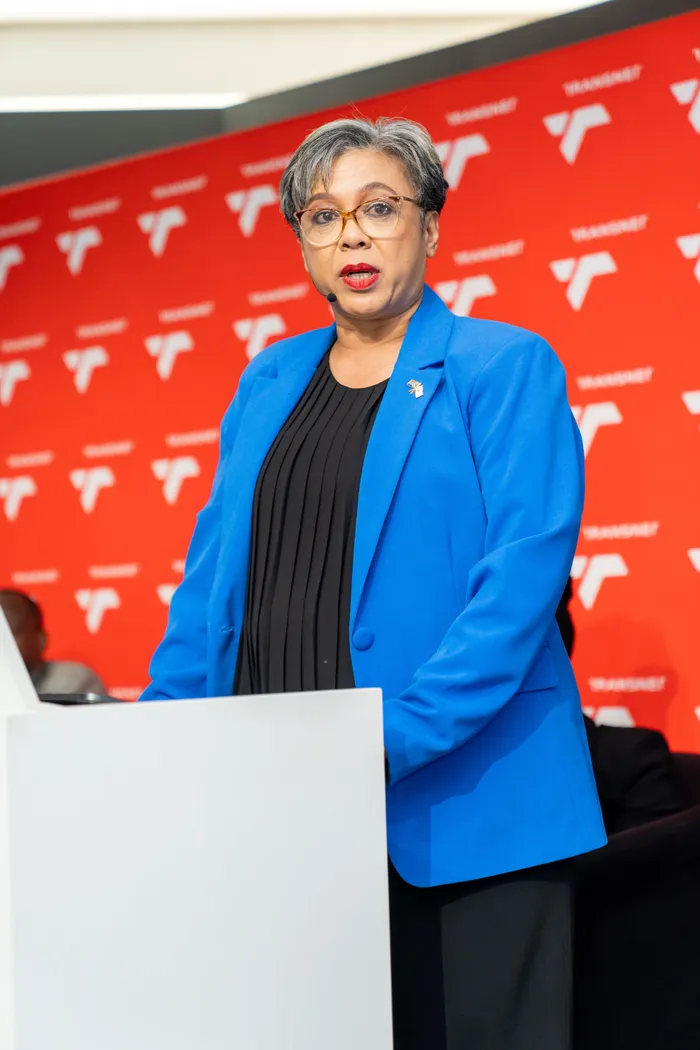Transnet sees 7.8% revenue boost after slashing annual loss to R1.9bn
LOGISTICS

Transnet Group CEO, Michelle Phillips, at the presentation of annual financial results on Friday.
Image: Supplied
Transnet’s annual results for the financial year ending 31 March 2025 reveal a promising financial turnaround for the state-owned logistics company, highlighting substantial revenue growth and notable improvements in operational efficiency.
The results, unveiled on Friday, showed a 7.8% rise in revenue, amounting to R82.7 billion largely attributed to weighted average tariff increases, alongside volume gains in the automotive and rail sectors.
In a year marked by comprehensive changes, Transnet reported a decrease in net operating expenses, falling by 4.9% to R52.1 billion.
Additionally, the company showcased an impressive 39.4% increase in earnings before interest, taxes, depreciation, and amortization (Ebitda), reaching R30.6bn.
The Ebitda margin, which stands at 37.0%, underscores the firm’s capacity for generating profit relative to its revenue.
Despite the positives, Transnet concluded the year with a net loss of R1.9bn, although this reflects a 74% improvement from the previous year’s loss of R7.3bn.
The results have elicited mixed reactions from industry stakeholders, but many see the narrowing of losses as a critical step towards long-term profitability.
Transnet’s commitment to operational recovery through the implementation of a Recovery Plan has begun to bear fruit, with significant improvements noted within the rail business.
The organisation has experienced increased operational efficiency, positioning itself to meet the needs of its customers while contributing to the broader South African economy.
“Transnet’s revenue performance for the year ended 31 March 2025 improved by 7.8%, when compared to the prior year,” Transnet said.
“This was driven by weighted average tariff increases as well as volume increases in the automotive and rail businesses, but lower pipeline and container volumes partially offset the revenue increase.”
Malcolm Hartwell, Norton Rose Fulbright director and master mariner, highlighted the impact of the National Logistics Crisis Committee's involvement since June 2023.
Hartwell said these led to achievements such as the establishment of a Rail Infrastructure Manager and enhancements in port infrastructure, and private sector participation in terminal operation and development.
“Transnet attributes these improvements to the implementation of its recovery plan and to tariff increases and volume increases in the rail and automobile sectors, which were partially offset by a decline in container and pipeline volumes,” he said.
“This, in turn, drives South Africa’s economy and generates sorely needed revenue for the fiscus to support the GNU’s challenge to meet massive societal demands to keep a growing electorate satisfied, many of whom are unemployed and most of whom are struggling to meet the basic demands of their families.”
Ulrich Joubert, a senior economist, said that Transnet's annual results are good news.
“Transnet has a debt of almost R145bn. So, if we look at that, then of course, every improvement in income is good news. Good news if the revenue is increasing, and that of course also indicates that they are transporting bigger volumes, perhaps also at better prices.”
Joubert added that Transnet has shown indications of growth.
“Freight rail is, of course, the important part. Every improvement is good news, but if we think of the figures that we had previously and in the financial year 2017-18, they moved 226 million metric tons of goods on the rail,” Joubert said.
“Nowadays, we're talking about just in the 2023-24 financial year, they moved 152 million tons. So, while the 10 million tons increase is an improvement, it is small compared to the previous volumes transported. But once again, as I've said with the financial situation, this is also an improvement.”
BUSINESS REPORT